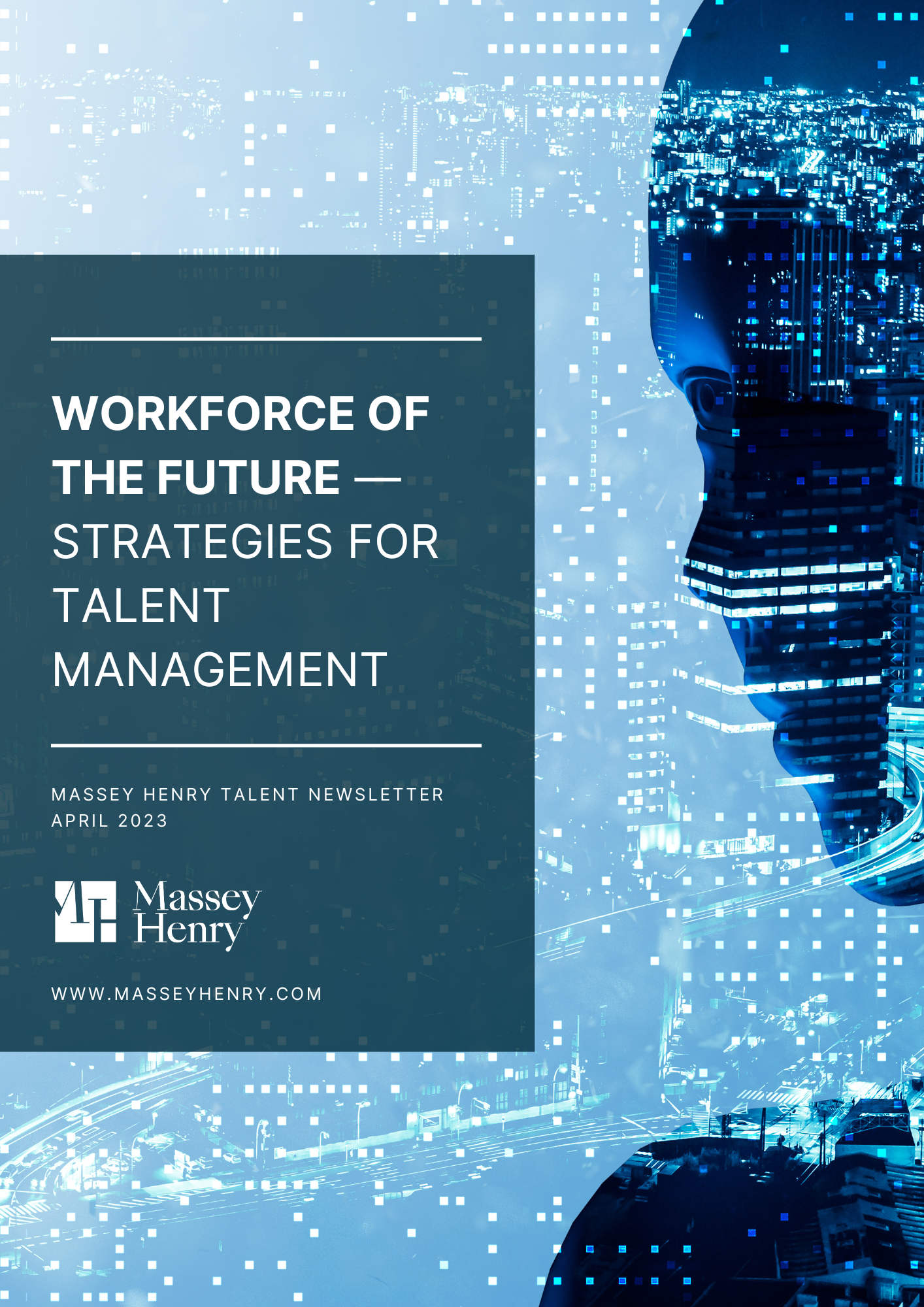
Summary
In our latest report, Michael Henry (Managing Partner) and John Sanders (Senior Partner, Board & CEO Services) examine:
- The impact of COVID-19 and its implications on the current and future workforce.
- The importance of conducting a comprehensive workforce and talent management analysis, including key factors to consider.
- How organizations can develop a multi-pronged strategy to address workforce challenges and opportunities.
In leading HR, legal, and corporate strategy within the financial services sector, and working closely with Michael Henry on key executive recruitments, I have found that an honest reflection on workforce and talent management issues is critical to success. Whether examining key skill gaps or evaluating value propositions for retention and recruitment, a candid assessment of an organization’s stage of development is imperative when addressing workforce challenges — now and in the future.
Our latest report examines talent management strategies that financial services organizations can leverage to better prepare for the workforce of the future.
Introduction: The Impact of COVID-19
The COVID-19 pandemic permanently accelerated the technology adoption curve — businesses, customers, employees, and society were all driven to adapt and transform at a rapid pace. During this time of unprecedented change, employers primarily responded with a survivalist approach, accommodating for factors such as the transition to e-commerce and changes to health and safety policies.
In the post-COVID financial services landscape, organizations continue to grapple with the path forward.
Broader macro forces in society, economy, and culture were also accelerated due to the pandemic. Much like technology, many slower-moving societal forces were advanced quickly, including matters concerning equality, diversity, economic division, and sovereign and territorial integrity. More importantly, COVID’s drastic impact on health, the economy, society, and culture resulted in a collective reassessment of many employees’ core values.
In addition to technology, broader macro forces in society, economy, and culture were also accelerated by the COVID-19 pandemic. More importantly, the pandemic’s impact on health, the economy, society, and culture resulted in a collective reassessment of employees’ core values.
Embracing Optionality
Howard Marks, the co-founder of Oaktree Capital Management and one of the most accomplished investors of his generation, frequently notes, “you cannot predict the future.” The validity of this statement has been corroborated over the last three years, given the many inaccurate predictions regarding emerging trends and issues as a byproduct of the pandemic.
If we presume that Marks is correct in his assessment that it is impossible to predict the future, leaders should recognize that ‘optionality’ is at the core of an organization’s response to future workforce challenges. Optionality refers to developing talent management approaches that will enable the organization to pivot based on a well-designed set of core principles and valid data.
Workforce & Talent Management Analysis
Managing issues related to workforce and talent management must begin with a fulsome consideration of the following:
An honest reflection of the organization’s stage of development regarding these factors will be critical in developing a list of viable ‘options’ to better address challenges presented by a ‘workforce of the future’ issue. Conducting an organizational analysis such as this is not a point-in-time project, nor is it an exercise meant to fundamentally change an organization’s mission, values, or social purpose.
Rather, partaking in this self-assessment is an opportunity to demonstrate the organization’s ongoing commitment to talent management — now and for the future.
Developing a Strategy
To begin, addressing workforce retention and recruiting challenges requires commitment from the board and executive teams; it should not be the sole responsibility of HR or the talent management function to address these powerful and systemic issues in a vacuum.
Effective strategy-building will require multi-stakeholder participation to develop a comprehensive and thorough approach. By its nature and importance, the strategy should be flexible and agile with a high level of optionality, as discussed.
It is also essential for stakeholders involved in developing responses to access the best available employee data and information on key trends. This includes employee demographics, attraction and retention data, employee exit interview information, and employee pulse surveys. The depth and breadth of information that organizations possess will vary.
However, it is nevertheless vital to establish a baseline of talent management information and work to expand the scope as time and budget permit. Strong decision-making is based on sound data and real-time organizational intelligence.
It is essential for key organizational stakeholders to access the best available employee data and information on key trends. This includes employee demographics, attraction and retention data, employee exit interview feedback, and pulse surveys.
Adopting a Multi-Pronged Approach
In the aftermath of the COVID-19 pandemic, employees have made it clear that they are concerned about more than just compensation and career advancement. The events of the past several years have encouraged employees to reset their priorities, and organizations must respond with value propositions that are aligned accordingly.
To support retention and recruitment, the organizational response will need to encompass a broad range of initiatives and policies, including:
- Re-evaluating the importance of skills vs. position and industry experience
- Prioritizing internal skill development and identifying growth opportunities for employees
- Identifying quality hires with skills and attributes aligned with future workforce requirements
- Improving opportunities for internal mobility
- Ensuring that teams adhere to inclusivity and diversity principles, including in hiring practices
- Elevating the importance of leadership and management training
The Role of Leaders & Managers
As mentioned, employment conditions, skill set requirements, workforce demographics, and employee motivations have significantly changed over the past few years. Organizations must embrace the reality of a shifting work environment, beginning with leadership.
Leaders and managers will play a critical role in ensuring that organizations respond successfully to these evolving issues, including by interacting effectively with their teams.
Organizations must also assess the ability of managers to cope with the pace of change and adapt to new talent management realities, as well as an evolving business environment. Managers and leaders that are ill-fitted with the above will likely accelerate turnover given the candidate market and employee expectations in a post-pandemic workforce.
As the adage says, “there are no bad teams, just bad leaders.”
The Bottom Line
Over the past decade, the rapid transformation in how and where we work has been profound; this reality was further accelerated by the COVID-19 pandemic and its aftermath.
To adapt, leaders will need to embrace and accept that the status quo may no longer suffice.
This is clear when reviewing research, such as by The World Economic Forum in 2020, which indicated that one billion people will need to be reskilled by 2030. A systemic re-evaluation of work, its processes and supporting programs must therefore be conducted comprehensively and transparently.
For boards, executives, and employees, proactively adapting to the workforce of the future is no longer an option—it’s a necessity.
À propos de Massey Henry
Executive Search, Coaching, Assessment, and Advisory Services
Massey Henry is an innovative executive search firm specialized to the financial services sector in Canada, delivering on a broad spectrum of leadership roles within the industry.
Our senior team of seasoned executive search professionals bring more than 60 years of combined experience in the financial services and executive search industries.
Whether corporate and commercial banking, insurance, asset management, or FinTech, we are a specialized firm that understands the nuances within the financial services sector and have developed a deep network of vetted executive candidates from coast to coast.
In addition to executive search, Massey Henry also provides clients with executive coaching, assessment, and leadership advisory services to help strengthen their board and executive teams.

Michael Henry
Managing Partner, Massey Henry

John Sanders
Senior Partner, Board & CEO Services

Alex Bunyan
Partner & Co-Head, Leadership Practice

Elaine Lajeunesse
Partner & Co-Head, Leadership Practice







